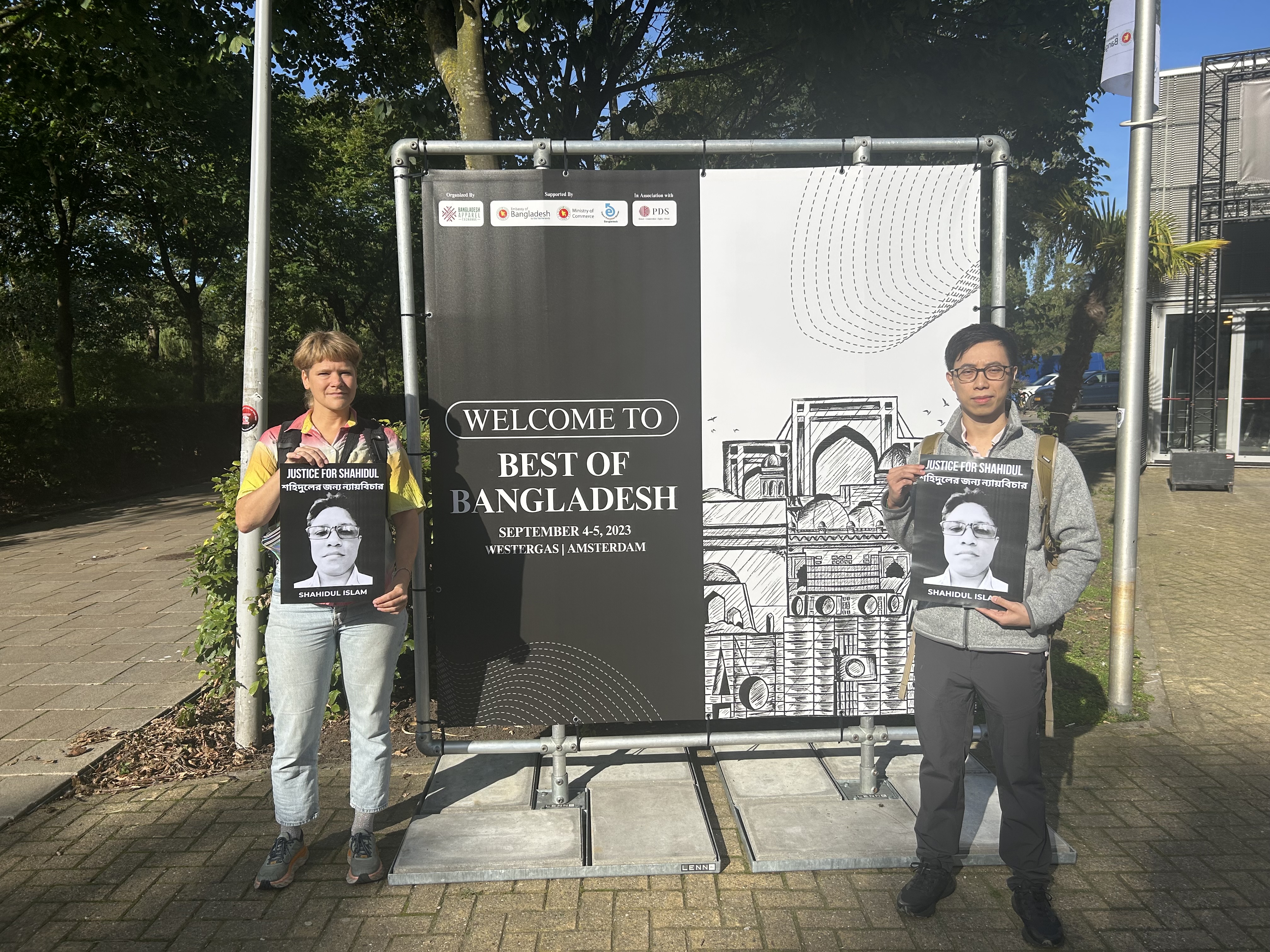
Activists urge Bangladesh garment industry to take action after murder of trade unionist
Today, Clean Clothes Campaign activists protested in Amsterdam at a promotional exposition of the Bangladesh garment industry to urge the government of Bangladesh, the employers’ association, and all brands sourcing from Bangladesh to take immediate action in the wake of the recent murder of trade unionist Shahidul Islam. Activists held up banners outside and spoke up in the conference room to demand justice for Islam’s family, safeguards for the right to organise, and a new minimum wage in line with workers’ demands.
On 25 June 2023, Shahidul Islam was attacked and killed in front of the Prince Jacquard Sweater Ltd factory in Tongi, Bangladesh, right after meeting with the factory management to help workers collect their due bonuses and wages. The gang of men who attacked him berated him for demanding workers’ wages as they kicked and punched him. Shahidul Islam was an organiser for the Bangladesh Garment and Industrial Workers Federation (BGIWF) for 25 years, where he fought for workers’ rights. He was the sole breadwinner of his family and leaves behind his wife, who is suffering from cancer, and two sons.
This murder is a brutal reminder of the risks faced by unionists and any worker standing up for their rights in Bangladesh and will have a severe chilling effect on the organising environment in the country. Especially in the context of the country’s current overdue wage review, it is crucial to ensure that workers can organise and speak up freely. Activists therefore today protested outside as well as spoke up inside the Best of Bangladesh event in Amsterdam. Clean Clothes Campaign activists had to resort to public actions as as the Clean Clothes Campaign representative's event registration was not granted. During and after the action, the organisers stressed that they value dialogue, but none of the panels feature any independent trade union representatives or other worker representatives. Dialogue about workers without workers is meaningless. Best of Bangladesh is meant to “solidify Bangladesh’s position as an unrivaled global sourcing destination where opportunities abound.” The garment industry is vital for the livelihood of millions of workers in Bangladesh, but it can only sustainably support them if workers can freely stand up for their own rights, without risk of intimidation, retaliation, or violence, and actually earn a wage sufficient to feed their families. That is why the protesters urged for the following steps:
Justice for Shahidul Islam
- We urge the government of Bangladesh to thoroughly and transparently investigate the murder, identifying all perpetrators, including connections between the assailants and the factory management.
- We urge the factory and brands sourcing from the factory to ensure compensation of at least 24,934,830 BDT (ca. 211,000 EUR) for Shahidul Islam’s family to replace his expected lifetime earnings in line with ILO Convention 121, as well as substantial additional compensation for their emotional pain and suffering.
Ensure safeguards for Freedom of Association
- We urge brands sourcing from Bangladesh to ensure protection of freedom of association and ensure that all their suppliers provide access to organisers of independent union federations to speak to workers and remain neutral during any independent organizing effort. Brands should clearly communicate their expectations to suppliers around respect for fundamental labour rights, including freedom of association and collective bargaining, and promptly investigate and take action to address any violations of these rights.
- We urge brands that have signed the International Accord for Health and Safety in the Textile and Garment Industry to ensure that freedom of association provisions are strengthened in the new programme due to start in November, and that all brands which have not yet signed the Accord do so immediately.
- We urge the government of Bangladesh to create an enabling environment for workers’ right to organise through labour law reform, which includes observing key ILO Conventions, lowering thresholds to independent union registration and ensuring the process is transparent, taking action against illegal termination and blacklisting of unionists as well as any form of retaliation, and prosecuting any employers who violate the rights of workers to freely organise, join, and participate in independent unions and to collectively bargain.
- We urge the Bangladesh Garment Manufacturers and Exporters Association (BGMEA) to ensure a zero-tolerance policy for violence and retaliation against trade unionists, and especially to ensure full respect for the right to organise of all workers of Ready Made Garment sector.
Establish a monthly minimum wage of at least 23,000 BDT (ca. 195 EUR)
- We urge all brands sourcing from Bangladesh to publicly announce their support for a 23,000 BDT minimum wage and express to suppliers their willingness to reflect this in pricing paid for product.
- We urge the government of Bangladesh and BGMEA to, through their representation in the wage board, agree to a minimum wage of at least 23,000 BDT.
Without these measures, justice for this brutal murder, with widespread implications for Bangladeshi society and the rights of garment workers, will remain elusive. The organisers and participants of the event can make a stand today by speaking out for a 23,000 BDT minimum wage to show they are serious when they say they want change for the industry. For the sake of the garment industry and its workers, the government of Bangladesh, the BGMEA, and brands sourcing from Bangladesh must ensure that workers’ rights are upheld. Respect for workers' rights and an industry with decent jobs are the only viable route to achieve today’s exposition’s goal to solidify Bangladesh’s position as global sourcing destination.